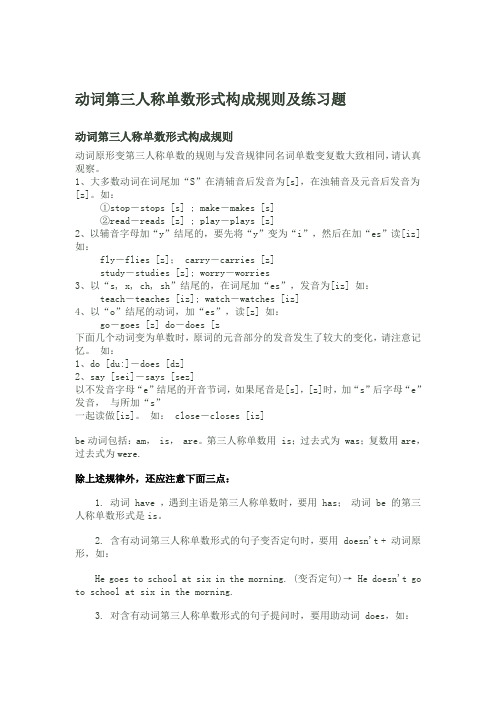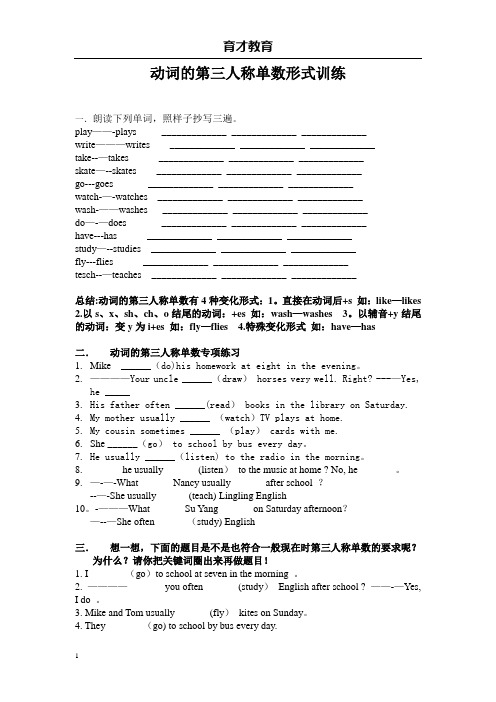动动词词的第三人称单数练习题
- 格式:doc
- 大小:43.00 KB
- 文档页数:17

动词第三人称单数形式构成规则及练习题动词第三人称单数形式构成规则动词原形变第三人称单数的规则与发音规律同名词单数变复数大致相同,请认真观察。
1、大多数动词在词尾加“S”在清辅音后发音为[s],在浊辅音及元音后发音为[z]。
如:①stop-stops [s] ; make-makes [s]②read-reads [z] ; play-plays [z]2、以辅音字母加“y”结尾的,要先将“y”变为“i”,然后在加“es”读[iz] 如:fly-flies [z]; carry-carries [z]study-studies [z]; worry-worries3、以“s, x, ch, sh”结尾的,在词尾加“es”,发音为[iz] 如:teach-teaches [iz]; watch-watches [iz]4、以“o”结尾的动词,加“es”,读[z] 如:go-goes [z] do-does [z下面几个动词变为单数时,原词的元音部分的发音发生了较大的变化,请注意记忆。
如:1、do [du:]-does [dz]2、say [sei]-says [sez]以不发音字母“e”结尾的开音节词,如果尾音是[s],[z]时,加“s”后字母“e”发音,与所加“s”一起读做[iz]。
如: close-closes [iz]be动词包括:am, is, are。
第三人称单数用 is;过去式为 was;复数用are,过去式为were.除上述规律外,还应注意下面三点:1. 动词 have ,遇到主语是第三人称单数时,要用 has;动词 be 的第三人称单数形式是is。
2. 含有动词第三人称单数形式的句子变否定句时,要用 doesn't + 动词原形,如:He goes to school at six in the morning. (变否定句)→ He doesn't go to school at six in the morning.3. 对含有动词第三人称单数形式的句子提问时,要用助动词 does,如:She goes home at five every day. (对划线部分提问)→ When / What time does she go home every day?一般现在时中的第三人称单数形式在一般现在时中,当主语是第三人称单数时,谓语动词要用第三人称单数形式,即常在动词原形后加-s或-es。

动词单三练习题一、选择题1. 尽管天气很冷,Tom还是决定去游泳。
A. decidesB. decidedC. decides toD. deciding2. 我的妹妹每天早晨都按时起床。
A. wakes upB. woke upC. is waking upD. was waking up3. 那个男孩经常帮助他的邻居修理东西。
A. helpsB. helpedC. is helpingD. was helping4. 她喜欢在公园里散步。
A. likesB. likedC. is likingD. was liking5. 我的叔叔在图书馆工作。
A. worksB. workedC. is workingD. was working二、填空题6. 我的狗_________(喜欢)追逐蝴蝶。
[答案:likes]7. 太阳_________(升起)在东方。
[答案:rises]8. 孩子们_________(正在玩耍)在操场上。
[答案:are playing]9. 她_________(不喜欢)吃鱼。
[答案:doesn't like]10. 他_________(通常)在晚上学习。
[答案:usually studies]三、改错题11. The cat is likes to climb trees.[答案:The cat likes to climb trees.]12. She was sings beautifully last night.[答案:She sang beautifully last night.]13. The children are playing soccer in the garden. [答案:The children play soccer in the garden.]14. He does his homework every day.[答案:He does his homework every day.]15. The flowers was blooming in the spring.[答案:The flowers were blooming in the spring.]四、翻译题16. 他经常在周末去钓鱼。

动词第三人称单数练习题动词第三人称单数练题(一)在一般现在时中,当主语是第三人称单数时,谓语动词要用第三人称单数形式,即常在动词原形后加-s或-es。
但有些同学们对于哪些主语是第三人称单数还不十分清楚,现归纳总结如下:一、人称代词he, she, it是第三人称单数。
如:1.He XXX cars.他喜欢车。
2.She goes to school at seven.她七点去上学。
3.It has a good name.它有一个好名字。
二、单个人名、亲朋好友等称呼作主语是第三人称单数。
如:1.Pat XXX从不在地板上扔垃圾。
2.Miss Wang waters the XXX.XXX给花一天浇水一次。
3.Aunt XXX阿姨经常做XXX.我妈妈每天都洗碗。
三、第三人称单数形式的构成1.普通间接在词尾加s,如:work-works live-lives make-makes2.以s, x, ch, sh等末端的单词加es ,如:miss-misses fix-fixesi.finish-finishes XXX3.以子音字母加o末端的单词,加es如: go-goes do-does4.非凡变形的有:have-has四、问句:问句中遇到第三人称单数时,需要用助动词does,动词变为原形。
What does she like?When XXX?How often does your sister comb her hair?操演1、将括号里动词的恰当方式填入横线上。
1. I ________ XXX)2. He _________ in the corridors. (run)3. She ___________ her face once a day. (wash)4. They ____________ their teeth once a day. (brush)5. You ___________ up your clothes once a day. (hang)6. We____________ our home work once a day. (finish)7. He____________ rubbish in the classroom. (throw)8. She_____________ rubbish on the floor. (throw)9. I_____________ rubbish in the bin. (throw)10. They ___________ the table once a day. (set)11. Peter never _________ in the corridors. (run)12. Mary usually _________ the table. (set)13. Pat and Ken _________ the plants in the morning. (water)14. The boy __________ his hair once a day. (comb)15. Miss Cheng _________ TV at home. (watch)16. My sister __________ XXX(pack)17. My mother _________ dinner for me. (cook)18. My parents _________ the house at Chinese New Year. (clean)19. My teachers _________ us some gifts. (give)20. My friends _________ the table with me. (set)操演2、挑选精确的单词填到括号里。

可编辑修改精选全文完整版动词第三人称单数形式的练习题及答案一、用括号内动词的适当形式填空。
1.He often ________(have) dinner at home.空1答案:has2.We _______(not watch) TV on Monday.空1答案:didn't watch3.Nick _______(not go) to the zoo on Sunday.空1答案:didn't go4.______ they ________(like) the World Cup?空1答案:Do空2答案:like5.What _______they often _______(do) on Saturdays?空1答案:do空2答案:do6._______ your parents _______(read) newspapers every day?空1答案:Do空2答案:read7.The girl _______(teach) us English on Sundays.空1答案:teaches8.She and I ________(take) a walk together every evening. 空1答案:takes9.There ________(be) some water in the bottle.空1答案:are10.Mike _______(like) cooking.空1答案:likes11.They _______(have) the same hobby.空1答案:have12.My aunt _______(look) after her baby carefully.空1答案:looks13.You always _______(do) your homework well.空1答案:do14.I _______(be) ill. I’m staying in bed.空1答案:am15.She _______(go) to school from Monday to Friday. 空1答案:goes16.Liu Tao _______(do) not like PE.空1答案:does17.The child often _______(watch) TV in the evening.空1答案:watches18.Su Hai and Su Yang _______(have) eight lessons this term.空1答案:have19 Mike’s sister ________ (cook) nice food. I _______ (like) eating it very much.空1答案:cooks空2答案:like20_______ (do) your father_______ (watch) TV in the evening? No, he_______ (not). 空1答案:Does空2答案:watch空3答案:doesn't21 Tom usually_______ (play) football after school空1答案:plays22 He _______ (live) in a small town near Nanjing.空1答案:lives23 I like_______ (cook) and_______ (grow) flowers.空1答案:cooking空2答案:growing24 I ______ (go ) to school by bus, and he ______(go) to school by bike. 空1答案:go空2答案:goes25 Who ________ (sing) beautifully in your class? Jim.空1答案:sings二、把下列动词变为第三人称单数形式。

第三人称单数的变化规则一、哪些主语是第三人称单数?(一)人称代词he, she, it是第三人称单数。
如: 1. He likes cars. 他喜欢车。
2. She goes to school at seven. 她七点去上学。
3. It has a good name. 它有一个好名字。
(二)单个人名、地名或亲友的称呼等作主语,是第三人称单数。
如: 1. Miss Wang(人名) waters the flowers once a day.王老师一天给花浇水一次。
2. Beijing is in China. 北京在中国。
3. Aunt Mary(亲友) usually makes cakes.玛丽阿姨经常做蛋糕。
(三)单数可数名词或“this/that/the+单数可数名词”作主语时,是第三人称单数。
如:1. A horse is a useful animal. 马是有用的动物。
2. This book is yours. 这本书是你的。
3. That car is red. 那辆小车是红色的。
4. The cat is cute. 这只猫是可爱的。
(四)不定代词someone, somebody, nobody, everything, something, 作主语时,是第三人称单数。
如:1. Everyone is here. 每个人都到齐了。
2. Everything is OK. 万事俱备。
(五)不可数名词作主语时,看作第三人称单数。
如:1. The milk is in the glass. 牛奶在玻璃杯里。
(六)当数字或字母作主语时,看作第三人称单数。
如:1.“6”is a lucky number. “6”是个吉利的数字。
2. “I”is a letter. “I”是个字母。
二、第三人称单数形式的构成(一)一般直接在词尾加 -s如:1. work-works live-lives make-makes(二) 以o, s, x, ch, sh等结尾的单词加 -es如: go-goes do-does miss-misses fix-fixes finish-finishes teach-teaches (三)以辅音字母加y结尾的单词,变y为i, 再加 -es如: fly-flies carry-carries(四) 特殊变形的有: have-has一般疑问句和特殊疑问句一、一般疑问句be动词(am, is are)肯定:Yes, 主语+引导词引导词can/will/should等情态动词答语do/does/did助动词否定:No, 主语+引导词+not二、特殊疑问句(即由特殊疑问词引导的疑问句)特殊疑问词有:when, where, who, what, whose, why, howbe动词(am, is are)特殊疑问词+ can/will/should等情态动词+ 主语+ 谓语+ 其他do/does/did助动词改写否定句型be动词+ notcan/will/should等情态动词+ not主语+ do/does/did + not + 谓语动词感叹句的表述What + a/an + 形容词+ 名词例:What an interesting film!How + 形容词+ 主语+ 谓语例:How interesting the film is!补充知识点动词原形如:buy(买)1、be going to + 地点如:the park打算... 时间如:on Monday2、want to + 动词原形表示“想要...”3、在......转弯用介词“at”, 如turn left at.../turn right at4、like + V-ing, 如:He likes playing basketball.5、by + 交通工具,表示交通方式。

动词的第三人称单数形式训练一.朗读下列单词,照样子抄写三遍。
play——-plays _____________ _____________ _____________ write———writes _____________ _____________ _____________take--—takes _____________ _____________ _____________skate—--skates _____________ _____________ _____________go---goes _____________ _____________ _____________watch-—-watches _____________ _____________ _____________wash-——washes _____________ _____________ _____________ do—-—does _____________ _____________ _____________have---has _____________ _____________ _____________study—--studies _____________ _____________ _____________fly---flies _____________ _____________ _____________tesch--—teaches _____________ _____________ _____________总结:动词的第三人称单数有4种变化形式:1。
直接在动词后+s 如:like—likes 2.以s、x、sh、ch、o结尾的动词:+es 如:wash—washes 3。
以辅音+y结尾的动词:变y为i+es 如:fly—flies 4.特殊变化形式如:have—has二.动词的第三人称单数专项练习1.Mike ______(do)his homework at eight in the evening。
动词第三人称单数的变化规则讲解及习题练习(附答案)1. 大部分单词可以直接在动词后: +s例:like -- like splay -- play swork--work sread--read swrite--write s发音规则:所加的“s”在清辅音后,发【s】,works在浊辅音及元音后,发【z】,plays在d 后与s 一起发【dz】,reads在t 后与s 一起发【ts】,writes2. 以s, x, sh, ch, 结尾的动词: +es例:watch -- watch esbrush-- brush eswash--wash es发音规则:词尾加的“es”,发【iz】3. 以辅音+o 结尾的动词: +es例:go -- go esdo -- do es发音规则:词尾加的“es”,发【z】,does4. 以辅音+y 结尾的动词: 变y 为i+es例:fly -- fl iesstudy -- stud iescarry--carr ies发音规则:词尾加的“es”,发【iz】,carries5. 不规则变化:例:have -- hasbe 动词的单三形式是:is练习题1. 写出下列动词第三人称单数。
drink ________ go _______stay ________ make _______look ________have_______pass_______ carry ________come_______ watch______plan_______ fly ________study_______ brush________do_________ teach_______2. 用所给单词的适当形式填空。
(1) He ______ (go) to school by bus every morning.(2) Jim _______ (have) many toys.(3) Lucy ______ (study) very hard.She ______ (be) never late for school.(4) Ken _______ (like) his father very much.答案:1.drinks goes stays makes looks has passes carries comes watches plans flies studies brushes does teaches2. (1) goes (2) has (3) studies is (4) likes。
七年级上册英语动词第三人称单数形式的练习Drink - drinksGo - goesStay - XXXMake - XXXLook - looksHave - hasPass - passesCarry - carriesCome - comesWatch - watchesPlant - plantsFly - fliesStudy - studiesXXX - XXXXXX - XXX1.Does he watch TV at night。
Yes。
he does.2.Do you go to school every day。
No。
I don't.3.Do Jack and Peter like apples?4.Does XXX go swimming on Sunday?5.Do they play football。
Yes。
they do.6.Do we have a good teacher。
Yes。
we do.7.Do they jump rope。
No。
they do not.8.Does your dog walk in the zoo?9.Do I have a big nose。
No。
you do not.10.Do your cats eat fish。
Yes。
they do.11.Do their mothers go shopping。
No。
they do not.12.I do not speak Japanese。
Do you speak Japanese?1.I have a cat.2.She has a beautiful garden.3.They have a big house.4.He has two cars.5.We have a lot of homework.6.You have a nice smile.7.XXX has us food.8.She has a new job.9.They have a cute baby.10.He has a good sense of humor.1.I drew a nice picture.2.He is a good friend.3.XXX.4.XXX.5.XXX.6.XXX.7.Her XXX got a vase.8.Our teacher read an English book.9.Our XXX XXX.XXX.11.Nancy has many skirts.12.David has some jackets.13.XXX.14.What do you want?15.What does Mike have?16.What do your friends like?17.What does Helen want?18.His XXX.19.Her sister has a nice doll.20.Miss Li read an English book.否定句:1.She doesn't do her homework every day.2.XXX't live in Shanghai.3.XXX.4.Danny hasn't seen the apple tree.5.XXX.一般疑问句:1.Does the desk have four legs。
动词单三练习题动词单三练习题动词是语言中最基本的词类之一,它用来表示动作、状态或存在。
在英语中,动词的单三形式是指动词在第三人称单数时的变化形式。
学习动词的单三形式对于掌握英语语法和写作非常重要。
下面是一些动词单三练习题,帮助你巩固这一知识点。
1. The cat (sleep) peacefully on the sofa.2. She (run) every morning to stay fit.3. The flowers (bloom) beautifully in the garden.4. He (play) the piano with great skill.5. My parents (work) hard to provide for our family.6. The sun (shine) brightly in the sky.7. They (study) together for the upcoming exam.8. The baby (cry) loudly in the middle of the night.9. The birds (sing) melodiously in the trees.10. He (write) a letter to his friend every week.动词的单三形式是通过在动词原形后加上-s、-es或-ies来表示的。
一般情况下,动词单三形式在大多数动词中都是在动词原形后加上-s。
例如,在第1题中,"sleep"是动词原形,而"sleeps"则是它的单三形式。
然而,有一些规则需要注意。
当动词以s、x、ch、sh或o结尾时,动词单三形式需要在动词原形后加上-es。
在第3题中,"bloom"以m结尾,所以它的单三形式是"blooms"。
同样地,在第6题中,"shine"以e结尾,所以它的单三形式是"shines"。
动词第三人称单数的变化规则及练习一、变化规则1、直接在动词后 +s例如:like- likes play-plays2、以 s, x, sh, ch, 接尾的动词: +es例如:wash-washes3、以辅音 +o 接尾的动词: +es例如:go-goes4、以辅音 +y 接尾的动词:变y 为 i+es例如:fly-flies动词短语:+s:Plays, skips, sings, gives, starts, likes,buys some toys, gets up comes back homemakes noodles, eats lunch drinks coffeebegins his class , practises the piano+es :watches TV brushes his teethgoes to bed goes to schooldoes my homework does some readingy→ i+ es: fly→ flies study→ studies注意:不规则变化: have-----has,be-------is,do-----does写出下列动词的第三人称单数drink ________ go _______ stay ________ make ________look _________ have_______ pass_______ carry ____come________ watch______ plant_______ fly ________study_______ brush________ do_________ teach_______二、请看下面两组句子,注意区分他们的共同点和不同点。
I go to school every day.I don't go to school every day.He goes to school every day.He doesn't go to school every day.Do you go to school every day?Yes, I do. (No, I don't)Does he go to school every day?Yes, he does. (No, he doesn't)注:1)第三人称单数用了does 后面就不用动词的s 形式了 ,而用动词原形 .。
动动词词的第三人称单数练习题动词原形变第三人称单数的规则与发音规律同名词单数变复数大致相同,请认真观察。
1、大多数动词在词尾加“S”在清辅音后发音为[s],在浊辅音及元音后发音为[z]。
如:①stop-stops [s] ; make-makes [s]②read-reads [z] ; play-plays [z]2、以辅音字母加“y”结尾的,要先将“y”变为“i”,然后在加“es”读[iz] 如:fly-flies [z]; carry-carries [z]study-studies [z]; worry-worries3、以“s, x, ch, sh”结尾的,在词尾加“es”,发音为[iz] 如: teach-teaches [iz]; watch-watches [iz]4、以“o”结尾的动词,加“es”,读[z] 如:go-goes [z] do-does [z下面几个动词变为单数时,原词的元音部分的发音发生了较大的变化,请注意记忆。
如:1、do [du:]-does [dz]2、say [sei]-says [sez]以不发音字母“e”结尾的开音节词,如果尾音是[s],[z]时,加“s”后字母“e”发音,与所加“s”一起读做[iz]。
如: close-closes [iz]be动词包括:am, is, are。
第三人称单数用 is;过去式为 was;复数用are,过去式为were.除上述规律外,还应注意下面三点:1. 动词 have ,遇到主语是第三人称单数时,要用has;动词 be 的第三人称单数形式是is。
2. 含有动词第三人称单数形式的句子变否定句时,要用doesn’t + 动词原形,如:He goes to school at six in the morning. → He doesn’t go to school at six in the morning.3. 对含有动词第三人称单数形式的句子提问时,要用助动词 does,如: She goes home at five e very day. → When / What time does she go home every day?一般现在时中的第三人称单数形式在一般现在时中,当主语是第三人称单数时,谓语动词要用第三人称单数形式,即常在动词原形后加-s或-es。
I 什么是一般现在时?一般现在时的基本用法有哪些呢?一般现在时的功能1.表示事物或人物的特征、状态。
如:The sky is blue.天空是蓝色的。
2.表示经常性或习惯性的动作。
如:I get up at sixevery day.我每天六点起床。
标志词:always, every week , once a week,every?, sometimes, at?, on Sunday uausllyoften,never,hardly..........3.表示客观现实。
如:The earth goes around the sun.地球绕着太阳转。
一般现在时的构成1. be动词:主语+be+其它。
如:I am a boy.我是一个男孩。
2.行为动词:主语+行为动词。
如:We study English.我们学习英语。
当主语为第三人称单数时,要在动词后加”-s”或”-es”。
如: Mary likes Chinese.玛丽喜欢汉语。
一般现在时的变化1. be动词的变化。
a 否定句:主语+ be + not +其它.如:He is not a worker.他不是工人。
b 一般疑问句:Be +主语+其它。
如:-Are you a student?-Yes. I am. / No, I’m not.c 特殊疑问句:疑问词+一般疑问句。
如:Where is my bike?2.行为动词的变化。
a 否定句:主语+ don’t +动词原形。
如:I don’t like bread.b 当主语为第三人称单数时,要用doesn’t构成否定句。
如:He doesn’t often pl ay.c 一般疑问句:Do +主语+动词原形+其它。
如:- Do you often play football?- Yes, I do. / No, I don’t.当主语为第三人称单数时,要用does构成一般疑问句。
如:- Does she go to work by bike?- Yes, she does. / No, she doesn’t.特殊疑问句:疑问词+一般疑问句。
如:How does your father go to work?II 哪些主语是第三人称单数? 现归纳总结如下:一、人称代词he, she, it是第三人称单数。
如:He likes watching TV. 他喜欢看电视。
he has lunch at twelve. 她十二点吃午餐。
It looks like a cat. 它看起来像只猫。
二、单个人名、地名或称呼作主语;是第三人称单数。
如:①Han Mei looks like h er mother. 韩梅看起来像她的母亲。
②Beijing is in China. 北京在中国。
③Uncle Wang often makes cakes. 王叔叔经常做蛋糕。
三、单数可数名词或”this / that / the+单数可数名词”作主语时,是第三人称单数。
如:①A horse is a useful animal. 马是有用的动物。
②This book is yours. 这本书是你的。
③That car is red. 那辆小汽车是红色的。
④The cat is Lucy’s. 这只猫是露茜的。
四、不定代词someone, somebody, nobody, everything, something等及指示代词this,that作主语时,是第三人称单数。
如:①Everyone is here. 大家到齐了。
②There is something wrong with the watch. 这块手表有毛病。
③This is a pen. 这是一支钢笔。
④That is an eraser. 那是一块橡皮擦。
五、不可数名词作主语时为第三人称单数。
如:①The milk is in the glass. 牛奶在玻璃杯里。
②The bread is very small. 那面包很小。
六、当数字或字母作主语时,看作第三人称单数。
如: ①”6” is a lucky number. “6”是个吉利数字。
②”I” is a letter. “I”是个字母。
巩固练习题:I 写出下列动词的第三人称单数形式:sit--guess-- die--go--rush-- reach-- touch-- brush--fly--copy--say--run--do-- fix-- live-- cry--enjoy-- have--wish-- play--Tie--teach-- buy--study--drink-- go-- stay-- make--look-- carry-- come-- watch--plant-- fly -- do--二、用括号内动词的适当形式填空。
1. He often ________ dinner at home.2. Daniel and Tommy _______ in Class One.3. We _______ TV on Monday.4. Nick _______ to the zoo on Sunday.5. ______ they ________ the World Cup?6. What _______they often _______ on Saturdays?7. _______ your parents _______ newspapers every day?8. The girl _______ us English on Sundays.9. She and I ________ a walk together every evening.10. There ________ some water in the bottle.11. Mike _______ cooking.12. They _______ the same hobby.13. My aunt _______ after her baby carefully.14. You always _______ your homework well.15. I _______ ill. I’m staying in bed.16. She _______ to school from Monday to Friday.17. Liu Tao _______ not like PE.18. The child often _______ TV in the evening.19. Su Hai and Su Yang _______ eight lessons this term.20. -What day _______ it today?- It’s Saturday.三、按照要求改写句子1. Daniel watches TV every evening.___________________________________________________2. I do my homework every day. ___________________________________________________ _____3. She likes milk.___________________________4. Amy likes playing computer games. ___________________________________________________5. We go to school every morning.___________________________________________________ ____6. He speaks English very well.___________________________________________________ 7. I like taking photos in the park.___________________________________________________ _____8. John comes from Canada.___________________________________________________ 9. She isalways a good student. ___________________________________________________ _____10. Simon and Daniel like going skating.___________________________________________________ 动词第三人称单数练习题在一般现在时中,当主语是第三人称单数时,谓语动词要用第三人称单数形式,即常在动词原形后加-s或-es。